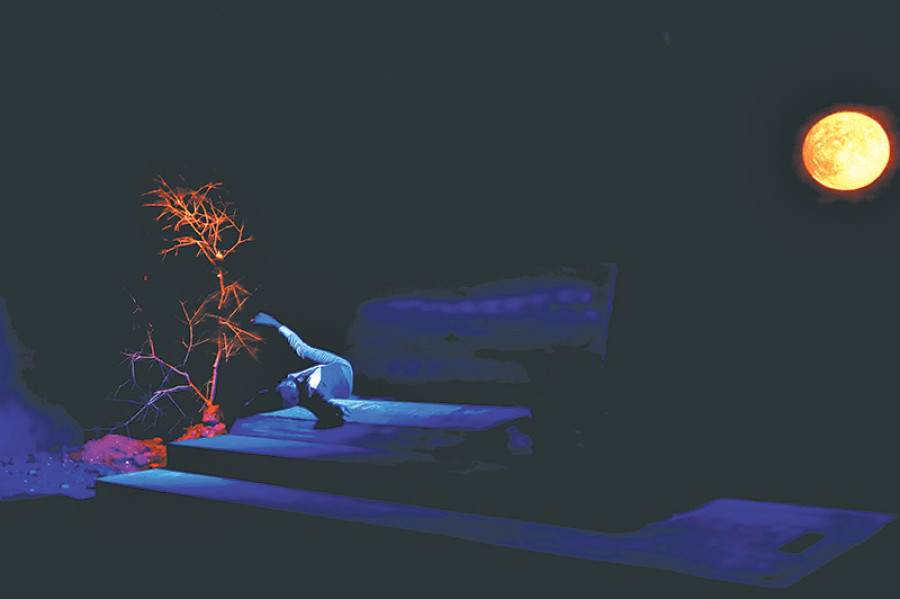Money
All the rage
This week saw the opening of a new theatre house in Kathmandu, the Kunja Theatre. As its debut production, the theatre house is currently staging A Madman’s Diary.
Timothy Aryal
This week saw the opening of a new theatre house in Kathmandu, the Kunja Theatre. As its debut production, the theatre house is currently staging A Madman’s Diary. The play is a dramatisation of a short story of same name written by Chinese author Lu Xun; the Nepali adaptation is done by director Che Shankar, and features a solo performance by actor Sudam CK.
Written at a time when China still functioned under a feudal system of governance, A Madman’s Diary is different from most short stories; it is written as a compilation of 13 different diary entries, the narrative of which “was most confused and incoherent,” as the narrator who prefaces the diary entries tells the reader.
The diarist, the preface reveals, was suffering with a form of persecution complex at the time the diary was written.
The diary entries revolve around the diarist’s obsessive fear that everyone he sees around him, even his own brother, is going to eat him alive. Even though the story is about cannibalism, the metaphor of flesh-eating people is aimed at the feudal bureaucracy of Qing China.
In the preface, it is also revealed that the diarist who is raging against the system, eventually takes up an official post under the same system, after he recovers from his complex.
So the man who criticises a certain system of government takes an official post under the same system. What’s the point? The point of the short story is made by its famous ending sentences: “Perhaps there are still children who have not eaten men? Save the children…”

In director Shankar’s rendition, we first encounter our diarist (played by Sudam CK) lying amid an array of disheveled documents. Behind him is a moon and around him is a barren tree, mud and a butcher’s block.
The diarist carries a look of wide-eyed surprise, contoured with frustration. He is wearing a shabby long coat and a trouser. Within the next hour he hovers around the stage, laughing and crying at random and announcing his obsessive fear that he is going to be eaten alive.
The interplay features a soundtrack by Aditya Katuwal, which transitions from hushed rustle of the trees to the cawing of birds, and sometimes what sounded like a loud explosions, perfectly in sync with what transpires on the stage. But it’s actor Sudam CK’s show; he performs the role of an eccentric, deranged character with an incredible depth, rendering moments of agony and frustration with equal alacrity. The audience cannot help but flow with the emotions he projects.
Director Shankar says that the play, even though written a century ago and set in China, resonates well with today’s Nepal, a ‘crony capitalist state’. “This is my attempt to put out a politically conscious play,” he said. “For me, the main objective of doing theatre is to awaken the audience and to nudge them to think about the state of affairs. We are currently living in a state of chaos. We know, very well, who the cannibals that the play refers to are.”
Shankar went on, “It was only after Kulman Ghising’s bid to end the endemic loadshedding that we realised that things could be done differently if the right people are appointed in the right positions. In the play’s universe, the madman diarist might be you and me, or Govind KC, or the deceased Nanda Prasad Adhikari.”
Even though the play has political motifs, Shankar says, his prime focus is on the existential questions it poses. “There is a society in all of us. Even though the play is political, it is also about the fundamental question of existence that the character grapples with.”
A Mad man’s diary is the director-actor duo of Sudam and Shankar’s second output, after 2016’s Eklabya ko Antim Tape, a Nepali rendition of a Samuel Beckett play, in which Sudam played a 59-year-old Eklabya recounting his bygone days.
“Both of these works provide ample room for directorial freedom. You can interpret it the way you like, with the use of lights, tone, and colours of your choice and the infusion of symbols and metaphors,” Shankar said. “With the unity of all these elements, what I aspire to do is to create a wave in the audience’s mind.
Living in a system as corrupt as ours, it is inevitable that the people themselves will eventually become corrupt as well. My job as a theatre artist is to awaken the audience out of that slumber. And whether I have succeeded or not is entirely for the audience to judge.”
A Madman’s Diary is on stage at Kunja Theatre every day at 5 pm.




 15.12°C Kathmandu
15.12°C Kathmandu















